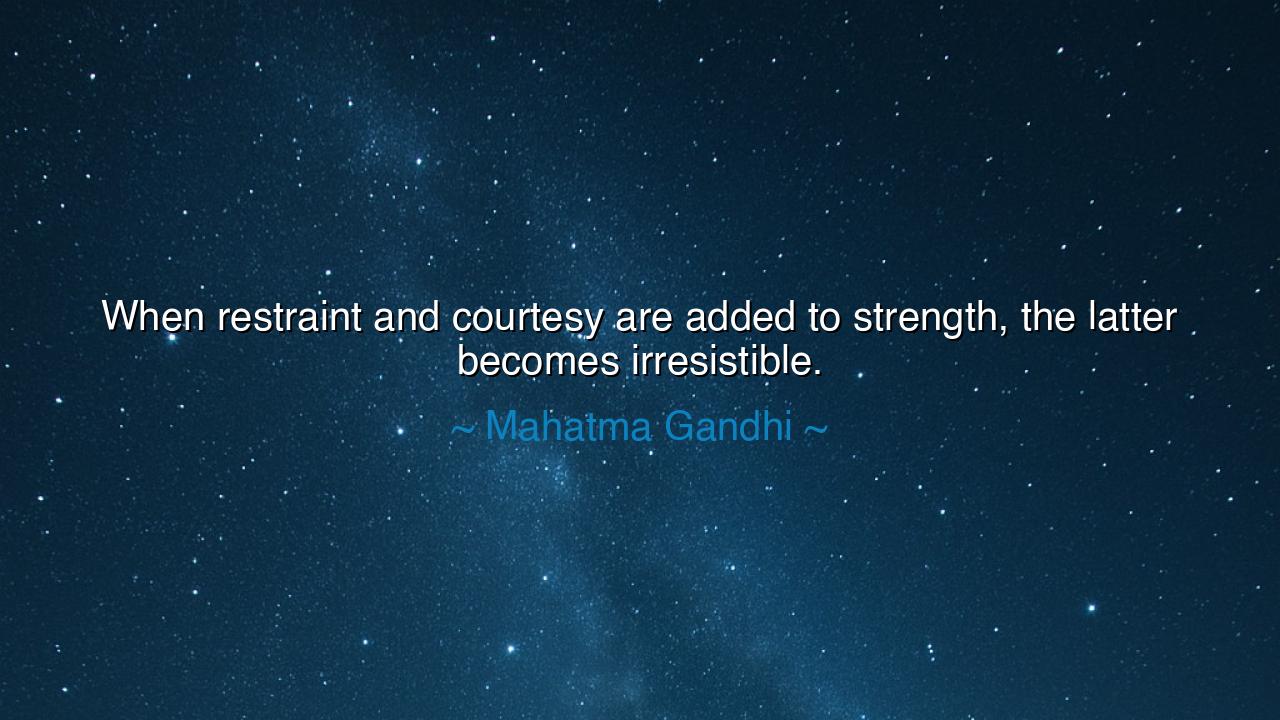
When restraint and courtesy are added to strength, the latter






Hear the voice of Mahatma Gandhi, who spoke not with the roar of armies but with the quiet thunder of truth: “When restraint and courtesy are added to strength, the latter becomes irresistible.” In these words lies a wisdom as old as the ages, that power ungoverned is but savagery, but power guided by self-control and compassion becomes a force that no sword can pierce and no empire can subdue. For strength alone inspires fear, but strength with restraint inspires reverence, and strength with courtesy awakens loyalty and love.
The origin of this saying springs from Gandhi’s philosophy of satyagraha, or truth-force, born in the struggle against injustice in India. He knew that brute strength, whether of the oppressor or the oppressed, would only multiply hatred. But if strength were bound by discipline, by restraint in the face of provocation, and clothed with courtesy even toward the enemy, it would possess a different kind of power—moral, unyielding, and irresistible. This was the essence of his nonviolent resistance: to combine firmness with dignity, courage with humility, defiance with respect.
History shines with examples that reveal this principle. Recall the story of George Washington at the close of the American Revolution. The soldiers, weary and unpaid, were ready to mutiny, and the new nation stood on the brink of chaos. Washington addressed them not with anger but with courtesy, not with threats but with calm dignity. In that moment he showed restraint, reading aloud a letter and pausing to don his spectacles, saying, “I have grown gray in your service and now find myself growing blind.” The soldiers wept. Their rebellion melted. Washington’s strength, joined with courtesy, preserved the birth of a nation.
Contrast this with rulers who possessed strength without restraint. The conquests of Napoleon blazed across Europe, yet his unchecked ambition consumed his victories, leaving ruin in his wake. His strength inspired fear but not lasting reverence, and when his might faltered, no courtesy bound others to his cause. Gandhi’s words expose the difference: power without discipline is temporary; power with dignity endures.
The heart of Gandhi’s teaching is a paradox: true strength is not shown in domination but in self-mastery. To restrain anger when insulted, to act with respect when opposed, to meet violence without returning it—these are signs not of weakness, but of the highest strength. Courtesy, far from being softness, is a weapon sharper than any blade, for it disarms hostility and confounds the oppressor. Restraint, far from being cowardice, is the armor of the strong, for it proves that the spirit rules the body and not the other way around.
Consider Gandhi himself standing before the British Empire. Here was a man with no army, no wealth, no throne. Yet his strength lay in restraint—in his refusal to answer violence with violence. His courtesy toward those who imprisoned and mocked him robbed them of moral victory. And so, the mightiest empire of the modern age bowed to a frail man in homespun cloth, because his strength, clothed in dignity, was truly irresistible.
The lesson for us is eternal: cultivate strength, yes, but temper it with restraint, and clothe it with courtesy. Strength without these is noise and destruction; strength with them is harmony and victory. In daily life, this means mastering your anger, treating others with respect even when you disagree, and using your power not to crush but to elevate. When you act thus, your influence multiplies, your words pierce deeper, and your life becomes a light that none can ignore.
Thus, O seeker, remember Gandhi’s wisdom: restraint and courtesy are not ornaments of strength, but its crown. To be feared is easy, to be loved is harder, but to be irresistible is to be both firm and gentle, unyielding yet kind. This is the path of true power, the path of the ancients, the path that conquers not by the sword, but by the soul. Walk it, and you will find that no force on earth can stand against you.






AAdministratorAdministrator
Welcome, honored guests. Please leave a comment, we will respond soon